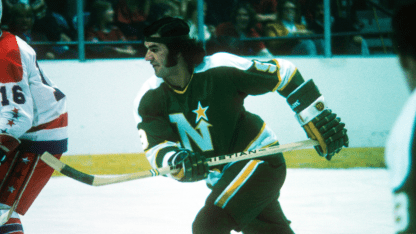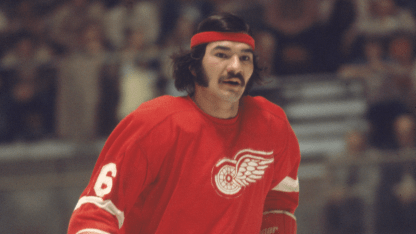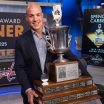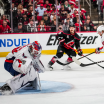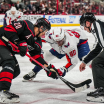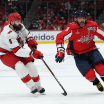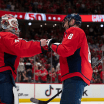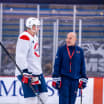A few years back, Caps winger T.J. Oshie started a successful hockey clothing line called Warroad, named after the small town in the far northern reaches of Minnesota where some of his ancestors lived before him.
Earlier this week, former NHL player Henry Boucha – a full-blooded Ojibwa Native American – passed away at the age of 72. Boucha was also born in Warroad in 1951, and the late Tim Oshie – T.J.’s father – was Boucha’s first cousin. Although Boucha’s own NHL career was senselessly cut short by one of the most violent on-ice incidents in the League’s history, he played a role in the development and advancement of Oshie’s own hockey career.
“Him and my dad were close,” says T.J. Oshie. “When they were together, they seemed like older brother and younger brother, but they were cousins.”
Oshie was born in Everett, Wash., and Boucha counseled Tim Oshie to allow T.J. to move to Warroad at a young age, believing he would face a higher level of competition in the hockey hotbed of Minnesota.
“I think I was out there [in Warroad] when I was 10 maybe, so 1996,” recalls Oshie. “And Hank – I call him Uncle Hank – he got me out there with my age group and I hit it off; I actually got into a fight with Gigi Marvin, surprisingly enough, and I think we both went off the ice crying.
“But Henry had been trying to get me and my family to move out to Warroad, where my grandparents grew up. Eventually, through some hardships in my family, Hank opened his door and I actually moved in with Henry by myself; I just started school and my dad came out a couple months later. I spent my first couple of months in Warroad in the room right next to Henry, and he got my hockey career going by opening his doors to me and introducing me to the town, and in getting me into the mix there in Warroad.”
Oshie proudly brought the Stanley Cup to Warroad in the summer of 2018 after the Caps won it. Like his Uncle Hank, Oshie also represented Team USA in the Olympics, famously starring in the shootout in the 2014 Sochi Games.
“Talking to Hank, you would get snippets of his past and his playing days,” recalls Oshie. “I can’t remember them off the top of my head, but some of them just didn’t seem like they could possibly be true, like stories of guys having cigarettes and shots of whisky in the locker room and stuff like that.
“As the years progressed, Henry moved out to the first hole of the local golf course. So every day when we were teeing off, we’d always stop and say hi to Uncle Hank. Sometimes we were greeted with a beverage that was a little stronger than we would like, but he would sit us down and tell us a quick story, and then we’d go find our balls by the green and continue with our round.”
A center during his NHL days, Boucha was a legendary high school player at Warroad High, where he played defense so he could remain on the ice for the entire 60 minutes if needed. Boucha played for Warroad’s varsity squad as an eighth-grader, and in his final game as a senior – a game played in front of more than 15,000 fans at the old Metropolitan Sports Center in Bloomington, home of the Minnesota North Stars in those days – his squad lost the 1969 state championship game to Edina by a 5-4 score in overtime. Boucha departed that game with an injury in the second period after absorbing a hard check along the boards. The hit ruptured Boucha’s eardrum, and he was unable to return to the ice.
After high school, Boucha played a season of junior hockey in Winnipeg, then joined the U.S. Olympic Team. At the age of 20, Boucha played a big role in Team USA’s stunning silver medal finish at the Sapporo Games in 1972. Drafted by Detroit in the second round (16th overall) of the 1971 NHL Entry Draft, Boucha led the U.S. National team in scoring in 1971-72 before embarking on his pro career. He also served in the U.S. Army, which released him from his obligation so that he could begin his pro career.
On Feb. 22, 1972, Boucha made his NHL debut with the Red Wings, facing Toronto in a game at the Detroit Olympia. With the Wings trailing 4-0 in the second period, Boucha beat Hall of Famer Jacques Plante for his first NHL goal, a tally that sparked a furious five-goal comeback in a 5-4 Detroit victory.

